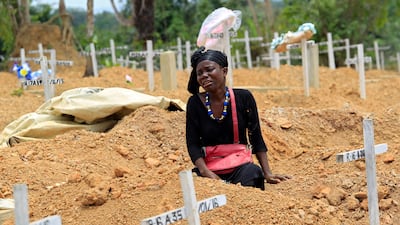With its rows of wooden crosses and Muslim-only section facing Mecca, the Disco Hill Cemetery looks like any other multi-confessional graveyard.
The only clue that this is no ordinary resting place is a strip of more than 200 plain white posts, each marking yet another burial plot dug hastily in the rain-soaked red soil.
"These were the bodies that were brought in off the streets during the Ebola outbreak," said Moses Davis, the burial supervisor, as he took The National on a guided tour.
"We didn't know whether they were Christians or Muslims, so we buried them with a post instead."
Carved out of 25 acres of bushland in a secluded spot outside the Liberian capital, Monrovia, the recently-built Disco Hill Cemetery is literally the Ground Zero of the Ebola crisis.
Some 3,000 people have been buried here since it was opened at the height of the outbreak in 2014 — so many, that the government is mulling plans to make it the site for a national monument.
_______________
Read more:
Liberia undertakers still haunted by Ebola after outbreak declared over
Liberia's Nyenswah recalls 'terrifying' Ebola crisis
Liberian hospital paid high price for Ebola prevention lessons
________________
When it was originally laid three years ago, however, the purpose was strictly practical.
At the time, Liberia lacked a single proper cemetery because locals preferred to do informal burials themselves, a ritual that involved them running their hands over a loved one's body before it was laid to rest.
The ritual is based on the belief that touching a newly-dead corpse offers relatives a way to communicate directly with dead ancestors. But during the Ebola outbreak, this also put them in direct contact with the virus, which is at its most infectious in a freshly-deceased corpse.
The government's short-term answer was to ban all traditional burials and decree that all bodies must be cremated instead. But this was hugely controversial in a country where bodies are deemed sacred, and where a major event in the spiritual calendar is "Decoration Day", when families visit graves to clean and adorn them.
"It got to the point where people were hiding dead bodies because they didn't want them to be cremated, which could cause Ebola to spread even more," said Brett Sedgewick, director of development services for Global Communities, the American non-governmental organisation that build the cemetery with money from USAID.
"We realised that the solution was to build a proper hygienic cemetery where bodies could be buried under proper supervision. But we also knew that if we were going to build one, it would have to be big enough to hold everyone, not just some."
The first challenge was finding a suitable site. It had to be close enough to Monrovia, Liberia's major population centre, but also on land where there was no risk of contaminating the water table.
Another issue was finding a landowner willing to host it, although as it turned out, Nimbyism was not a problem.
"Every local chief we talked to was happy to offer land if they had it, as they were all keen to be seen as the chief who helped bring cremation to an end in Monrovia," said Mr Sedgewick.
To sweeten the deal further, the local leaders who sold the land to the government were given a new primary school, a new road, and priority for the gravedigger jobs when the cemetery was being prepared.
_______________
Read more:
'Ebola-free' Liberia's fight may not be over
_______________
It opened just before Christmas 2014, with 500 graves filled within the first two months. While only a fraction are confirmed Ebola cases, the scale of the outbreak at the time was such that all deaths — Ebola related or otherwise — were subject to hygienic burial requirements.
Today it continues to take in bodies, and has the capacity to do for several years to come. Visitors can lay wreaths by the grave markers, some of which are already showing signs of wear and tear in the harsh Liberian sun.
Enduring rather better is the mystery of the cemetery's name, which hardly seems in keeping with such a sombre location.
None of the locals living in nearby settlements in Disco Hill could tell The National where it came from. However, Mr Sedgewick said it was better than naming it after the other nearby landmark, a former US army base known for its fragrant-smelling canteen, which frustrated locals were not allowed into.
"The base was nicknamed 'Smell No Taste' by the locals for that reason," Mr Sedgewick explained. "That would have been an even worse name for a cemetery."
_______________
Read more:
Lost lives and empty chairs: Liberians mark anniversary of Liberia outbreak
Ebola orphans struggle to resume their lives amid stigma
_______________

